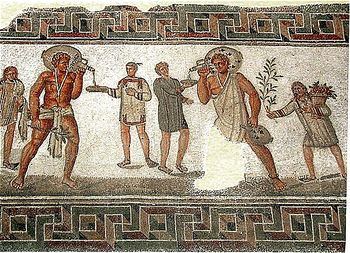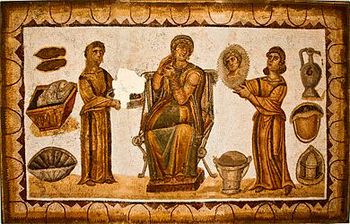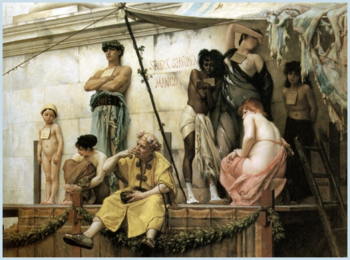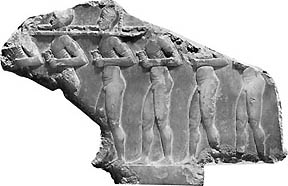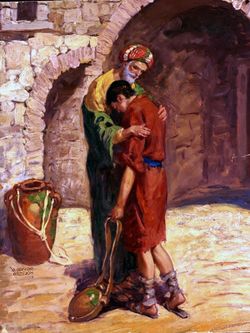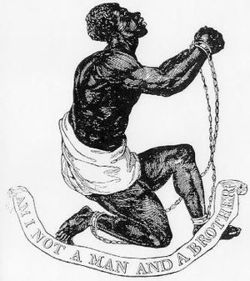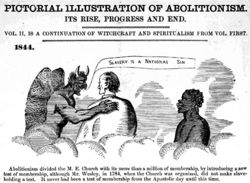Category:Slavery (subject)
Slavery was a consolidated institution in antiquity.
Slavery in the Greco-Roman World
In the Roman Empire, slaves were employed in a great variety of jobs and played an important role in society and the economy.
Unskilled slaves, or those sentenced to slavery as punishment, worked on farms, in mines, and at mills. The living conditions of these unskilled workers were brutal.
Slaves, women and children, were sexually exploited in brothels as prostitutes and young men were trained as gladiators. A few of them could have a successful career in their profession, but for most of them life expectance was very short.
Those slaves who performed domestic services in a rich household had better living conditions; they might be employed at highly skilled jobs and professions, as teachers, accountants, or physicians. They were allowed to earn their own money and hold some property. They might hope to save enough to buy freedom for themselves, their spouse and children. Domestic slaves often developed strong personal bounds with their masters; not rarely they were freed by the terms of their master's will, or for services rendered.
Roman slavery was not based on race. Most slaves were acquired through warfare. Many were infants abandoned at birth and raised by merchants, or children of poor families sold by their own parents. Adults (and their children) could be condemned to slavery for their debts or for some criminal offense. The slaves' children were born slaves.
Thousands and thousands of slave were sold in auctions at the city markets. Slaves made around 10% of the population of the Empire--5 millions of the 50 millions of its inhabitants. They were owned by the very restricted elite of Roman aristocratic families and landowners.
Servus non habet personam (a slave had no personality), nor rights, was a property of the master. Rebellions were frequent, the most famous being the rebellion of Spartacus in the first century BCE. However, living conditions gradually improved during the Empire, when some laws were enacted to protect the slaves from being too harshly mistreated.
Escaped slaves were hunted down and returned (often for a reward) and harshly punished by being whipped, burnt with iron, or killed by crucifixion. Any act of rebellion was severely repressed.
Slaves who obtained their freedom, however, gained all the privileges of born-free people. Some freedmen (liberti) became wealthy and very powerful and had important roles in Roman society.
The Attitude of Jews (and Christians) toward slavery
Slavery was recognized as a legitimate institution in ancient Israel and the Hebrew Bible contained norms to regulate the ownership and treatment of slaves. These norms were similar to the ones we find in the rest of the ancient Near East. They were meant to offer some protection to Israelite slaves, while the ownership of non-Israelite slaves was allowed and less subjected to regulations.
Slavery however never had a central role in the Israelite society. Being the Jews subjected to foreign rule, the major concern of Jewish Law was to redeem Jewish slaves owned by non-Jews (Lev 25:47-51), especially those taken as prisoners of war. The entire community felt the responsibility of paying back their freedom.
The experience of being oppressed and abused made many Jews reject slavery as an evil institution. For the Essenes in particular this was a distinctive feature of their way of life: "There is not a single slave among them, but they are all free, serving one another; they condemn masters, not only as representing a principle of unrighteousness in opposition to that of equality, but as personifications of wickedness in that they violate the law of nature which made us all brethren, created alike."
Like the Essenes, most of the first Christians looked at slavery as an evil institution.
Yet, there were a different attitude. James (and Palestinian Christians) were very vocal against social injustice:
James 1:9-10: "9 Let the believer who is lowly boast in being raised up, 10 and the rich in being brought low, because the rich will disappear like a flower in the field. 11 For the sun rises with its scorching heat and withers the field; its flower falls, and its beauty perishes. It is the same way with the rich; in the midst of a busy life, they will wither away."
James 2 -- "5 Listen, my beloved brothers and sisters. Has not God chosen the poor in the world to be rich in faith and to be heirs of the kingdom that he has promised to those who love him? 6 But you have dishonored the poor. Is it not the rich who oppress you? Is it not they who drag you into court?".
(James 5) Come now, you rich people, weep and wail for the miseries that are coming to you. 2 Your riches have rotted, and your clothes are moth-eaten. 3 Your gold and silver have rusted, and their rust will be evidence against you, and it will eat your flesh like fire. You have laid up treasure for the last days. 4 Listen! The wages of the laborers who mowed your fields, which you kept back by fraud, cry out, and the cries of the harvesters have reached the ears of the Lord of hosts. 5 You have lived on the earth in luxury and in pleasure; you have fattened your hearts in a day of slaughter. 6 You have condemned and murdered the righteous one, who does not resist you.
In the Hellenistic context, Paul also had some very radical phrases, suggesting that in Christ the distinction between slaves and owners has disappeared:
Galatians 3:28 -- There is neither Jew nor Greek, there is neither slave nor free, there is neither male nor female, for you are all one in Christ Jesus.
1Cor 12:13 -- For in one Spirit we were all baptized into one body—Jews or Greeks, slaves or free—and all were made to drink of one Spirit.
In 1 Corinthians slaves were told by Paul that they were to seek or purchase their freedom whenever possible:
1Cor 7:21-23 -- [21] Were you a slave when called? Do not be concerned about it. But if you can gain your freedom, avail yourself of the opportunity. [22] For he who was called in the Lord as a slave is a freedman of the Lord. Likewise he who was free when called is a slave of Christ. [23] You were bought with a price; do not become slaves of men.
Yet Paul returned the fugitive slave Onesimus to his Christian Master Philemon and never required Christian owners to free their slaves, but only to treat them fairly.
Philemon 1:10 -- [10] I am appealing to you for my child, Onesimus, whose father I have become during my imprisonment. [11] Formerly he was useless to you, but now he is indeed useful both to you and to me. [12] I am sending him, that is, my own heart, back to you. [13] I wanted to keep him with me, so that he might be of service to me in your place during my imprisonment for the gospel; [14] but I preferred to do nothing without your consent, in order that your good deed might be voluntary and not something forced. [15] Perhaps this is the reason he was separated from you for a while, so that you might have him back forever, [16] no longer as a slave but more than a slave, a beloved brother--especially to me but how much more to you, both in the flesh and in the Lord. [17] So if you consider me your partner, welcome him as you would welcome me. [18] If he has wronged you in any way, or owes you anything, charge that to my account...
Paul also invites Christian slaves to "bear" their condition with resignation.
2Cor.11.20 -- For you bear it if someone makes slaves of you, or devours you, or takes advantage of you, or puts on airs, or strikes you in the face.
More directly, 1 Peter invited Christian slaves to "accept the authority of your master" and endure even abuse like Jesus did. With the same words, Paul describes the relations between Husbands and wives: “Wives, in the same way, accept the authority of hour husbands,” while however inviting husbands to “show consideration” (3:1-7), something that the Letter does not demand to slave-owners.
1 Peter 2:18-25 (NRSV) -- [18] Slaves, accept the authority of your masters with all deference, not only those who are kind and gentle but also those who are harsh. [19] For it is a credit to you if, being aware of God, you endure pain while suffering unjustly. [20] If you endure when you are beaten for doing wrong, what credit is that? But if you endure when you do right and suffer for it, you have God's approval. [21] For to this you have been called, because Christ also suffered for you, leaving you an example, so that you should follow in his steps. [22] "He committed no sin, and no deceit was found in his mouth." [23] When he was abused, he did not return abuse; when he suffered, he did not threaten; but he entrusted himself to the one who judges justly. [24] He himself bore our sins in his body on the cross, so that, free from sins, we might live for righteousness; by his wounds you have been healed. [25] For you were going astray like sheep, but now you have returned to the shepherd and guardian of your souls.
The Letter to the Ephesians even claims that Christian slaves have to "obey your early masters ... as you would Christ"; and so do 1 Timothy and Titus who talk of their duty to honor their masters and be submissive to them.
Ephesians 6:5 -- Slaves, obey your earthly masters with fear and trembling, with a sincere heart, as you would Christ... [8] knowing that whatever good anyone does, this he will receive back from the Lord, whether he is a slave or free.
1 Timothy 6:1 -- Let all who are under a yoke as slaves regard their own masters as worthy of all honor, so that the name of God and the teaching may not be reviled.
Titus 2:9 -- Slaves are to be submissive to their own masters in everything; they are to be well-pleasing, not argumentative...
The Letter to the Colossians offers the better synthesis of all these elements in Paul. After stating that in the Church there is no distinction between slaves and free people, it goes on preaching to the slaves "obedience" and to their masters, "fair treatment".
Col 3:11 -- Here [i.e. in the church] there is not Greek and Jew, circumcised and uncircumcised, barbarian, Scythian, slave, free; but Christ is all, and in all.
Col 3:22 -- Slaves, obey in everything those who are your earthly masters, not by way of eye-service, as people-pleasers, but with sincerity of heart, fearing the Lord. Col.4.1 Masters, treat your slaves justly and fairly, knowing that you also have a Master in heaven.
The later theological debate on slavery
In the ancient word, slavery was such a widespread and recognized institution that nobody was advocating its abolishment. There was indeed a lot of discussion about a better treatment of the slaves and the recognition that they were "persons" and not mere pieces of property. The Stoics in particular distinguished themselves as activists for the rights of the slaves.
In Christian societies some laws were enacted to protect the slaves from abuse. The Church struggled to change the common perception that slaves were mere pieces of properties. For instance, John Chrisostom warned against sexual immorality with slaves: "He who has immoral relations with the wife of a slave is as culpable as he who has the like relations with the wife of the prince: both are adulterers, for it is not the condition of the parties that makes the crime" ("In I Thess.", Hom. v, 2; "In II Thess.", Hom. iii, 2).
The legitimacy of slavery however was not questioned until the 18th and early 19th century when the slave trade took such global proportion as to involve the capture of millions of people from Africa and their deportation in the American colonies, taking distinctive racial connotations.
Passages in the Bible were used by both pro-slavery advocates and abolitionists to support their respective views, with Church leaders and theologians taking one side or the other. Quakers were among the first Christian denominations to support officially abolitionism. The debate was particularly heated in the United States, where the Civil War divided the North and the South, the Union and the Confederates but also the Northern Christian denomination and the Southern Christian denominations, on the issue of the legitimacy of slavery. By the end of the 19th century, however, the argument for abolitionism had won its battle within Christianity. No major Christian denomination is today supporting slavery as a divine institution.
In Depth
- Slavery (sources) -- survey of ancient sources
- Slavery (research) -- survey of scholarly works
References
- Slaves, Slavery / J. Byron / In: T&T Clark Encyclopedia of Second Temple Judaism (2020 Stuckenbruck, Gurtner), edited volumes
- Slavery / Alejandro F. Botta / In: The Eerdmans Dictionary of Early Judaism (2010 Collins / Harlow), dictionary, 1232-1233
- Slavery / James Albert Harrill / In: Dictionary of New Testament Background (2000 Evans & Porter), dictionary, 1124-1127
- / [[]] / In: The Anchor Bible Dictionary (1992 Freedman), dictionary,
External links
- Slaves and Slavery / Wilhelm Bacher, Lewis N. Dembitz, Gotthard Deutsch, and Samuel Krauss / In: Jewish Encyclopedia (1901-1906 Singer), dictionary
- Slavery and Christianity / Paul Allard / In: Catholic Encyclopedia
External links
Pages in category "Slavery (subject)"
The following 14 pages are in this category, out of 14 total.
1
- The Apostle Paul's Opinion of Slavery and Emancipation (1837 Granger), book
- Slavery as Salvation: The Metaphor of Slavery in Pauline Christianity (1990 Martin), book
- The Manumission of Slaves in Early Christianity (1995 Harrill), book
- Ideas of Slavery from Aristotle to Augustine (1996 Garnsey), book
- Jesus, Born of a Slave: The Social and Economic Origins of Jesus' Message (1998 Munro), book
2
- Slavery in Early Christianity (2002 Glancy), book
- Slavery Metaphors in Early Judaism and Pauline Christianity (2003 Byron), book
- The Curse of Ham: Race and Slavery in Early Judaism, Christianity, and Islam (2003 Goldenberg), book
- Conceptions de l'esclavage, d'Aristote à saint Augustin (2004 Garnsey / Hasnaoui), book (French ed.)
- Jewish Slavery in Antiquity (2005 Hezser), book
- Slaves in the New Testament (2006 Harrill), book
- Recent Research on Paul and Slavery (2008 Byron), book
- A Cosmopolitan Ideal: Paul's Declaration 'neither Jew nor Greek, neither Slave nor Free, nor Male and Female' in the Context of First-Century Thought (2016 Neutel), book
- The Forgotten Creed: Christianity’s Original Struggle Against Bigotry, Slavery, and Sexism (2018 Patterson), book
